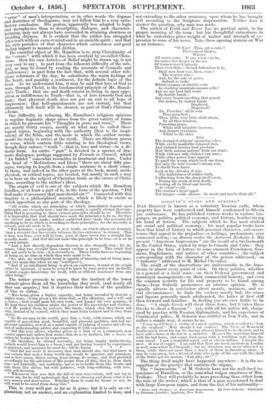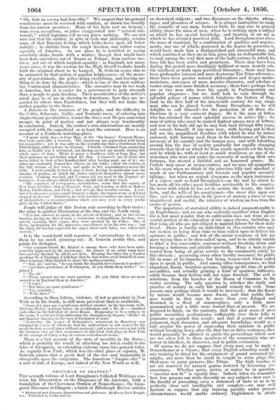GOLOVIN'S STARS AND STRIPES. * IVAN GOLOTIN is known as a
voluntary Russian exile, whose property has been confiscated and himself condemned to Siberia par contumace. He has published various works in various lan- guages, on politics, political economy, and history, besides trying his hand at fiction. The subjects which he has most studied are social and political economy ; his most popular books have been that kind of history in which personal character, and occur- rences that appeal to the prejudices or feelings, predominate over connected action,—as Russia under the Autocrat Nicholas I. His present "American Impressions" are the result of a twelvemonth in the United States, varied by trips to Canada and Cuba : they appear in the form of letters to some eminent Frenchmen, Ger- mans, Englishmen, and natives of other countries ; the subject corresponding with the character of the person addressed,—aa " Industry " addressed to M. Michel Chevalier.
The reellt of the observations are unfavourable to the Ame- ricans in almost every point of view. On their polities, whether in a general or a local sense—on their Federal government and municipal management—on their commercial honesty, and even the common security for life and property to be found among them—Ivan Golovin pronounces an adverse opinion. He is equally adverse in conclusion about morals, manners, and so- cial circumstances : he finds the cookery mostly bad, the wines and liquors generally much adulterated, the ladies at first stiff then forward and familiar. In dealing you are ever liable to be done. "A single Greek will cheat three Jews, but it takes three Greeks to cheat a Russian" : yet, with all his native wit, sharp- ened by practice with Russian diplomatists, and his experience of Continental police, M. Golovin was diddled at New York, and in rather a simple way, it seems to us. "I was myself here a victim of a mock auction' which is called to look at the elephant.' Why should I not confess ? The Vicar of Wakefield laughs much about his son for having allowed himself to be cheated, and to have sold a horse at the fair to a swindler. He goes the next time himself with his last horse, and comes back again with a worthless note from the same rascal. I saw a beautiful watch sold at eleven dollars. I bought the next. It was of copper. I tun told that there are mock auctions in London as well, somewhere in Cheapside ; but my attention was never attracted to them, while there are more than a dozen of them in Broadway alone. I may be very green, but a friend of mine who spoke of the case with the chief of the Police got for answer, Fair play, sir!' "
The thing itself might have happened anywhere : it is the re- cognition of the practice that contains the stigma.
The " Impressions " of M. Golovin have not the well-bred in- souciance of -Hamilton, or the somewhat vulgar smartness of Mrs. Trollope. They will probably be more provoking than either from the tone of the writer, which is that of a man accustomed to deal with large European topics, and from the fact of his nationality— Stars and Stripes ; or American Impressions. By lean Golovin. Published by Freeman, London ; Appleton, New York. "Oh, that an enemy had done this." We suspect that his general conclusions must be received with caution, as drawn too broadly from too narrow premises. Many of his facts rest on hearsay ; some seem exceptions, or jokes exaggerated into "natural uni- versals," which logicians tell us can prove nothing. We are not sure but that the author, in spite of exile and philosophy, retains some of that Russian feeling which looks down upon all below nobility ; he shrinks from the rough freedom and rather coarse equality of America. In one place he is horrified at seeing somebody shake hands with a waiter ; though that might have been done anywhere out of Russia or Poland, from various mo- tives, not one of which implied equality : in England, not many years since, it was the custom for the High Sheriff to shake hands with the criminal about to be hanged.. M. Golovin seems also to be animated by that notion of popular helplessness—of the neces- sity of government, the police doing everything, and leaving no- thing to be done by the people—which is one of the most sadden- ing Continental characteristics. The executive may be too weak in America, but it is easier for a government to gain strength than a people to gain freedom. These peculiarities of the writer's mind may be of use in showing to Americans how they are re- garded by others than Englishmen, but they will not make the author popular in the States. A distaste to the manners of the people, and the difficulty to the Celtic, Selavonie, Gallic, and Teutonic races, of entering into Anglo-Saxon peculiarities, render the Stars and Stripes somewhat meagre in point of matter, and not always very trustworthy in conclusion. Indeed, the author's own observations are mainly occupied with the superficial or at least the external. Here is an account of a Northern watering-place. "I spent eight days at Cape May, at the big house,' Vermont House, that looks quite like a barrack. The Americans arc reproached with being too inquisitive ; yet it was only on the seventh day that a Dutchman from Philadelphia addressed me in German. I hardly refrained from embracing him, so highly was I overjoyed, not having opened my mouth during this whole space of time. There is many a Southern lady at Cape May, but their manners are not better toned for that. I observed one of them who never failed to look at her handkerchief after having made use of it ; an- other one constantly leaned her elbows on the table, called for waiters to the full volume of her voice, and spoke to her acquaintances across the table. I went usually to bed at nine o'clock, having no particular taste for singing of psalms, in which the ladies enjoyed themselves almost every cveniug. Cooking was bad, and I cannot yet get used to the Negroes' at- tendance—I am always afraid lest they should soil all they touch. "The reporters of newspapers, nevertheless, wrote that the society at New Port outshines that of Brussels Paris, and London, or that of Baden- Baden, Cheltenham, and Vichy ; that at Cape May beauties swarm. I ven- tured to present a young smart brunette a chair ; she stared at me as if I had stepped on her toe. Doubtless, in such crowded assemblies one must beware of pickpockets; a recommendation which you may read in every public place in the United States."
People will judge of this Boston rule according to their tastes : the story is another illustration of the Sun and the North wind.
"It is not allowed to smoke in the streets of Boston ; and as two of our tourists, having no idea of such a restriction to Republican freedom, were quietly smoking their cigars, they were arrested by the Police. One of them, apologizing for his ignorance, was allowed to go his owh way ; but the other, for haying expressed his anger about such rules, was taken bid) custody."
It is the usual fault with reporters of conversations to overdo them by too much spinning-out : M. Golovin avoids this, and points his dialogues.
"Our common friend Mr. Kinkel is among those who have been unfa- vourably impressed by the Americans ; his nature of an artist must have been greatly shocked by all he saw here. Hearing the other day a Yankee speaking ill of England, I told him that he had better avail himself of some other language than English to abuse the mother-country.
"'But, sir,' said he, do you think the English Government is perfect ? ' "'And those gentlemen at Washington, do you think them better ? ' re- joined I.
" 'No, sir.'
"'Then, answer me one more question. Do you think there are more swindlers in England than in America ? ' " 'I don't.'
" But there are more gentlemen ? '
" Yes, certainly.'
" Well, then "
According to these letters violence, if not as prevalent in New York as in the South, is still more prevalent than is creditable.
"Some few days ago a gentleman stabbed another in the bar-room of St. Nicholas Hotel ; not long before an ex-alderman and a Mr. It— insulted each other in the full blast of Astor House. Happening to be a witness to the scene, I could not help addressing the champions in disgust, Hallo ! do not disgrace America in the eyes of foreigners at least.'
"Yesterday, the keeper of Delmonico's restaurant in Broadway was whipped by a man of whom he had the indiscretion to ask money for the meats he took several times without payment ; and a person conversant with the business told me that occurrences of this Ida took place in New York at the average of thirty a day in various refreshment-rooms."
There is a bad account of the state of morality in the States ; which is probably the result of attaching too much credit to the talcs of foreigners, or extending extreme cases into general rules. As regards eN New York, which was his chief place of sojourn, M. Golovin admits that a great deal of the vice and immorality is chargeable upon the emigrants. The American "Empire city" is a sort of sink of Europe, and indeed of the New World as well.



































 Previous page
Previous page